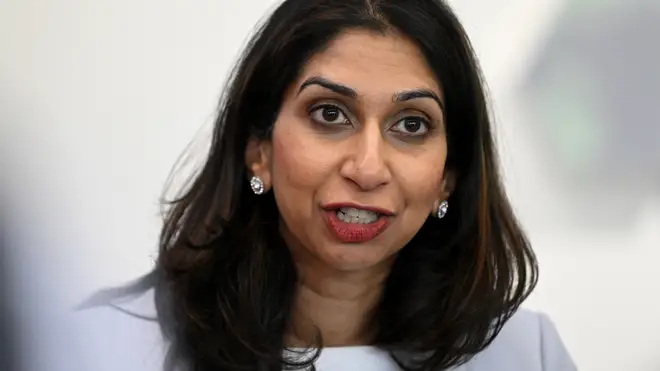
Nick Abbot 10pm - 1am
20 February 2024, 03:04

MPs have begun considering changes to investigatory powers laws.
Silicon Valley tech giants’ actions could “severely disable” UK spooks from preventing harm caused by online paedophiles and fraudsters, Suella Braverman has suggested.
The Conservative former home secretary named Facebook owner Meta, and Apple, and their use of technologies such as end-to-end encryption as a threat to attempts to tackle digital crimes.
She claimed the choice to back these technologies without “safeguards” could “enable and indeed facilitate some of the worst atrocities that our brave men and women in law enforcement agencies deal with every day”, as MPs began considering changes to investigatory powers laws.
The Investigatory Powers (Amendment) Bill includes measures to make it easier for agencies to examine and retain bulk datasets, such as publicly available online telephone records, and would allow intelligence agencies to use internet connection records to aid detection of their targets.
As the Commons started scrutinising the changes, Ms Braverman said: “We know that the terrorists, the serious organised criminals, and fraudsters, and the online paedophiles, all take advantage of the dark web and encrypted spaces to plan their terror, to carry out their fraudulent activity, and to cause devastating harm to some innocent people such as children in the field of online paedophilia.”
In a question to Home Secretary James Cleverly, she asked: “Does he share my concern and indeed frustration with certain companies like Meta and Apple?
“The former that has chosen to roll out end-to-end encryption without safeguards, the latter which has rolled out advanced data protection, which will allow these bad actors to go dark, which will severely disable agencies and law enforcement from identifying them and taking action, and which will enable and indeed facilitate some of the worst atrocities that our brave men and women in law enforcement agencies deal with every day?”
Mr Cleverly replied that the Government took harm done to children “incredibly seriously”, and valued the “important role” that investigatory powers have.
He added: “We will continue to work with technology companies, both those well established at the moment, and those of the future, to ensure that we maintain the balance between privacy and security as we have always done, but ensure that these technology platforms do not provide a hiding place for terrorists or serious criminals and those people taking part in child sexual exploitation.”
Labour former minister Kevan Jones urged the Government to ensure that there was “judicial oversight” of new powers to snoop on bulk datasets.
Mr Jones, a member of Parliament’s Intelligence and Security Committee, added: “Isn’t it the fact that if we are going to give these powers to the security services – which I approve of – that to ensure that we can say to the public that these are proportionate and also that there is an independent process in ensuring that these can’t be abused, surely judicial oversight throughout this should be an important thing?”
Mr Cleverly insisted there was oversight, including through the Intelligence and Security Committee.

When the Bill was considered by the House of Lords, ministers agreed to tighten new rules on the interception of MPs’ communications.
But SNP MP Joanna Cherry suggested it could still “open the door even further than its parent Bill on the surveillance of trade unions”.
The Edinburgh South West MP asked: “I wonder whether he will agree with me that there should be no place for the surveillance of trade unions in a democracy, and if he agrees with that, will he consider amendment to the Bill to make sure it doesn’t happen?”
Security minister Tom Tugendhat addressed concerns about trade unions, telling the Commons that rules around MPs’ communications had only been placed in the Bill because of the “particular” nature of their roles.
Mr Tugendhat added: “That doesn’t mean that any attitude against any other individual should be used cavalierly. It is not a question of the role or the post that a person holds, but their rights as a British citizen, and those rights as a British citizen should be absolutely guarded from intrusion or aggression from the state without exceptionally good reason.”
Labour shadow home secretary Yvette Cooper said her party would support the Bill and would “work with the Government to get the details of it right”.
Apple and Meta were contacted for comment.